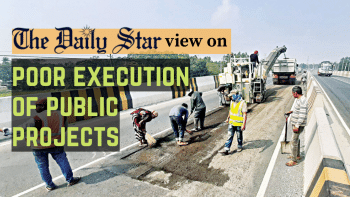Public Money: Easy Come, Easy Go

It's quite frustrating that, even in the middle of sky-high inflation numbers and sustained pressure on the public purse, hardly a day goes by without some government agency reporting losses, misspending or wasteful use of resources. Clearly, beyond passing the financial burden onto citizens, the government has no answer to the bad practices and policies that are causing this. On Saturday, three reports published by this newspaper alone showed how far the rot has spread.
The first report is about a project – a rail-cum-road bridge project of Bangladesh Railway (BR) in Kalurghat, Chattogram – that has been delayed by four years even before the work could begin. The project was taken up in 2018 after the Kalurghat railway bridge, built in 1931, was declared "risky". It was supposed to be completed in 2024, at a cost of Tk 1,200 crore. But four years on, not only has there been no progress in work, but the BR has now scrapped the design calling it "incomplete" and revised the project proposal to add a road deck above the previously designed rail deck, pushing the total estimated cost to Tk 6,341 crore.
The sheer apathy with which the whole project was planned, with loan from South Korea, to be repaid with public money, has not only increased its cost five times over, it also made sure citizens would be forced to use a risky bridge at least until 2028. In other words, they will have to pay more and suffer more because the railway authorities, who never seem to be able to do anything right or on time, once again failed to check mismanagement and irregularities.
The other report on wastefulness in the name of project revisions highlights three undertakings, all in various stages of development, by the Bangladesh Inland Water Transport Authority (BIWTA), Chattogram Development Authority (CDA), and Bangladesh Small and Cottage Industries Corporation (BSCIC), respectively. It goes without saying that by the time these delayed and costlier projects will be completed, the public will have paid a lot more than originally proposed. This near-habitual practice of time and cost overruns is as disturbing as the role of the Executive Committee of the National Economic Council (Ecnec) itself, which approves – and thereby encourages the culture of – project revisions without any accountability whatsoever for the officials involved. These officials often inflate project costs under various pretexts. We get its latest example in the third report of the day, which details the findings of an audit report that exposed gross corruption in at least three cases of purchase by the Civil Aviation Authority of Bangladesh (CAAB).
This near-habitual practice of time and cost overruns is as disturbing as the role of the Ecnec itself, which approves – and thereby encourages the culture of – project revisions without any accountability whatsoever for the officials involved.
All this points to how entrenched mismanagement is in our public work culture, which continues to hurt the economy and the people. We urge the authorities to stop this culture by establishing accountability for all officials involved in government projects and services. They must stop normalising bad policies and practices.


 For all latest news, follow The Daily Star's Google News channel.
For all latest news, follow The Daily Star's Google News channel. 








Comments